Welcoming a dog into your home brings immense joy, but it also comes with the responsibility of ensuring their health and safety. Just like humans, dogs thrive on a balanced diet, yet their digestive systems and metabolic processes differ significantly from ours. This means that many common household foods that are perfectly safe for people can be highly toxic, or even fatal, for our canine companions. Understanding What Foods Are Not Safe For Dogs To Eat is paramount for every pet owner, helping to prevent accidental poisonings that sadly affect thousands of pets each year.
Pet poisonings are a significant threat, with over 400,000 cases reported annually in the United States alone. While not all incidents are food-related, common human foods are a major contributor to these alarming statistics. This guide aims to equip you with essential knowledge, serving as your ultimate “cheat sheet” to identify dangerous foods and keep your beloved furry friend safe and healthy. Being prepared with accurate information about unsafe foods and understanding the potential risks is crucial for every dog owner. If you’re looking for a more extensive reference, this list of what foods dogs should not eat provides detailed information.
Why Certain Foods Are Toxic to Dogs
Canine digestion and metabolism operate distinctly from human systems, explaining why certain foods we consume safely are detrimental to dogs. A dog’s body processes some substances very differently, leading to toxic build-ups or severe reactions. For instance, theobromine and caffeine found in chocolate are metabolized much slower by dogs than by humans. This slower processing allows these substances to accumulate rapidly in their system, potentially leading to fatal consequences.
While a human can easily digest cherries, the cyanide present in their pits, stems, and leaves can pose a problem if ingested by a dog in significant quantities. Additionally, cherry pits are difficult for dogs to digest and can cause diarrhea, making it best to avoid them altogether. The severity of food toxicity can also be influenced by a dog’s size, breed, and overall health condition. This is why it’s critical to consult your veterinarian with any questions about foods your dogs can’t eat, ensuring you receive tailored advice for your specific pet.
Comprehensive List of Common Foods Dogs Cannot Eat
Many everyday household foods are dangerous, and often toxic, for dogs. Among the most frequently encountered foods that are bad for dogs are alcohol, avocados, macadamia nuts, grapes and raisins, xylitol, and chocolate. It is essential for your dog to avoid all the foods listed below. Keep in mind that this comprehensive overview of what foods are not safe for dogs to eat is not an exhaustive list but covers the most prevalent dangers.
Alcohol
Because dogs and cats are significantly smaller than humans, alcohol can have a much more severe, even deadly, effect on them. Even minimal amounts of alcohol can cause harm, and the smaller the pet, the greater the danger from even a small ingestion. Symptoms of alcohol poisoning in dogs mirror those in humans, including vomiting, breathing difficulties, coma, and even death. It’s crucial to keep all alcoholic beverages and products containing alcohol far out of your dog’s reach.
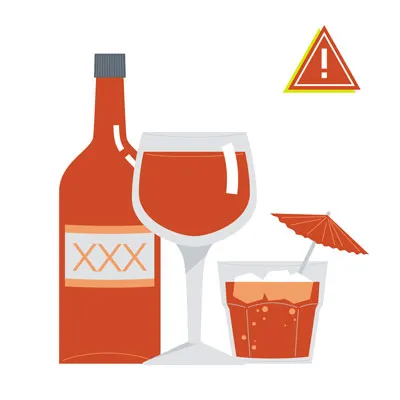 Alcoholic beverages can be deadly for dogs, even in small amounts.
Alcoholic beverages can be deadly for dogs, even in small amounts.
Apple, Apricot, Cherry, and Plum Seeds/Pits
While the fleshy part of apples is generally safe for dogs, the core and apple seeds are not. Apple seeds contain cyanide, and though small amounts may not immediately cause issues, it’s safest to avoid the core and seeds entirely. Similarly, apricot, cherry, peach, and plum seeds and pits must be avoided. These fruit pits also contain cyanide, which can lead to vomiting, an irregular and rapid heartbeat, seizures, coma, and even death due to the inability of red blood cells to effectively carry oxygen to cells.
Avocado
Avocados are not a good dietary choice for dogs. There have been documented cases of dogs suffering from myocardial damage after consuming avocados, particularly in South Africa. While these specific results haven’t been widely replicated, avocados are known to cause problems in other mammal species. Furthermore, an intact avocado pit can cause a dangerous gastrointestinal tract obstruction if swallowed. Therefore, it is best to completely avoid giving this food to your dog.
Broccoli
Broccoli contains isothiocyanates, which can be harmful to pets in very large doses. Although very small amounts of broccoli might be acceptable on occasion, it is generally best to avoid it, especially given the abundance of other healthy and safe food options available for dogs. Additionally, broccoli stalks can sometimes become lodged in a dog’s throat, leading to an obstruction.
Caffeine and Coffee Grounds
Caffeine contains methylxanthines, which can cause potentially fatal symptoms such as diarrhea, vomiting, seizures, and an irregular heartbeat in dogs. Ingesting coffee grounds or any highly caffeinated drink can cause your dog’s heart to race, leading to severe symptoms like seizures, tremors, arrhythmia, and difficulty breathing. Ensure all caffeinated products, including coffee, tea, and energy drinks, are kept inaccessible to your pet. For further reading on dangerous foods, you can refer to what foods can dogs can not eat.
Chicken & Turkey Skin, Ham, and Other Fatty Cuts of Meat
Fatty cuts of meat, including ham and skin from chicken or turkey, should be discarded rather than offered as treats to pets. These foods are particularly bad for dogs due to their high fat content, which can trigger acute pancreatitis—a life-threatening illness with severe complications. Pancreatitis is an inflammatory condition of the pancreas that can cause extreme pain and require urgent veterinary care.
It’s also crucial to avoid feeding turkey and chicken bones. If bones splinter, they can cause bowel obstruction or severe damage to the stomach or intestines. In some cases, a splintered bone can puncture these organs, leading to a fatal abdominal infection.
Chocolate
Chocolate toxicity is one of the most common reasons for pet poisonings, especially during holidays. Your dog absolutely cannot eat any chocolate product. Chocolate contains a lethal component called theobromine; the darker the chocolate, the higher its concentration of theobromine. Chocolate also contains caffeine, and some sugar-free chocolates may even include xylitol, all of which are highly toxic to dogs.
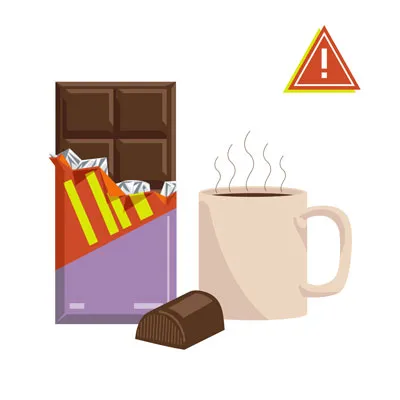 Chocolate contains theobromine and caffeine, which are highly toxic to dogs.
Chocolate contains theobromine and caffeine, which are highly toxic to dogs.
Dogs and cats metabolize chocolate much less efficiently than humans. Dark chocolate and baker’s chocolate are the most dangerous forms, but any type of chocolate can be problematic. Symptoms associated with chocolate ingestion can include hyperactivity, vomiting, diarrhea, pancreatitis, abnormal heart rhythm, and seizures. If your dog consumes any amount of chocolate, no matter how small, contact your veterinarian immediately. This is a critical item when considering what can dogs eat and not eat list.
Grapes and Raisins
Grapes and raisins are exceptionally dangerous for dogs. These fruits can lead to severe problems such as kidney failure because their tartaric acid is highly toxic to a dog’s kidneys. Even a few bites can wreak havoc on their system. Symptoms of raisin or grape poisoning include vomiting, diarrhea, loss of appetite, changes in the amount of urine passed, or a complete inability to urinate. If your dog ingests any amount of grapes or raisins, immediate veterinary attention is crucial.
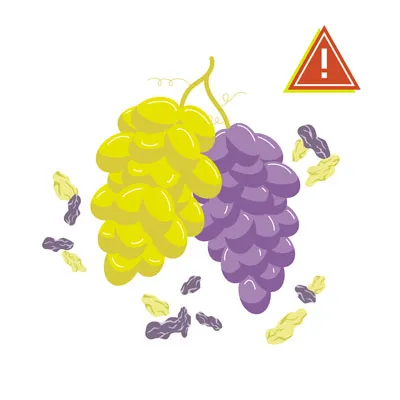 Grapes and raisins can cause serious kidney damage and failure in dogs.
Grapes and raisins can cause serious kidney damage and failure in dogs.
Macadamia Nuts, Almonds, and Pistachios
Macadamia nuts can cause dogs to suffer from numerous painful symptoms, including weakness, overheating, and vomiting. Although the precise mechanism of poisoning remains somewhat mysterious, these nuts are definitively considered toxic to dogs. As few as six macadamia nuts can induce severe poisoning in a small dog.
While macadamia nuts pose the greatest danger, other nuts, such as pistachios and almonds, can present choking hazards or become problematic if they are flavored or spiced. Always ensure any nuts are plain, unsalted, and in forms that won’t cause choking if you consider offering them in minimal amounts, but generally, it’s safer to avoid them.
Milk and Dairy Products
Milk and other dairy products should be evaluated on a case-by-case basis for dogs. Some dogs can consume milk or dairy products without issue. However, many dogs are lactose intolerant or allergic, experiencing symptoms like diarrhea and gas if they consume cow’s milk.
Ice cream is also considered bad for dogs primarily due to its high sugar and fat content. Instead of ice cream, try freezing small bites of healthy fruits that your dog can safely eat as a cool treat. As for cheese, it can be given in small quantities, but it’s best to stick to lower-fat varieties as an occasional treat rather than high-fat options.
Mushrooms
It is always safest to err on the side of caution and avoid feeding your dog any mushrooms. Mushrooms can contain a variety of toxins that may cause severe issues such as kidney and liver failure, vomiting, diarrhea, hallucinations, and damage to red blood cells. While washed, white mushrooms from the grocery store might be okay, it is generally much safer to opt for a different, confirmed-safe treat for your dog to eliminate any risk.
Nutmeg and Cinnamon
Dogs should never be fed any foods containing nutmeg. This spice can cause hallucinations and severe vomiting. Therefore, no matter how much your dog begs for a nutmeg-spiced cookie, do not give in. The toxic compound in nutmeg is myristicin, and its effects are most pronounced when ingested in high doses or by smaller dogs. If your dog consumes any amount of nutmeg, contact your veterinarian immediately for guidance.
Cinnamon should also be avoided, not primarily because it’s toxic, but because it can irritate your dog’s mouth. In some cases, it can lead to low blood sugar, which can have serious health consequences for your pup.
Onions, Garlic, Chives, and Leeks
Many pet owners are surprised to learn that herbs belonging to the allium family, such as onions and garlic, are not safe for their pups. Onions and garlic contain sulfoxides and disulfides, compounds that can damage red blood cells and cause anemia in both cats and dogs. Onion and garlic powders are present in many prepared foods, including baby food, so it is crucial to read labels carefully before offering any store-bought food to your pet.
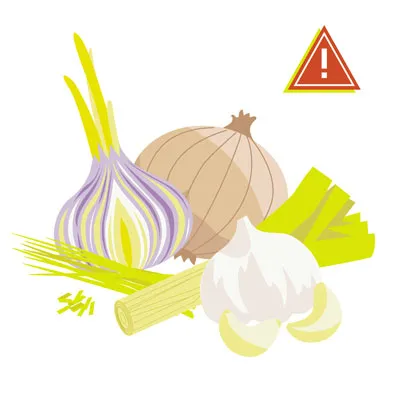 Onions, garlic, chives, and leeks contain compounds that can damage a dog's red blood cells.
Onions, garlic, chives, and leeks contain compounds that can damage a dog's red blood cells.
In fact, all allium plants, including chives and leeks, can cause potentially fatal anemia in dogs and cats. Certain Japanese dog breeds, such as Akitas and Shiba Inus, are particularly sensitive to allium plants, but these plants are dangerous for all dogs. Understanding this is key to knowing what can french bulldogs not eat, as breed-specific sensitivities exist.
Salt
Excessive amounts of salt can disrupt the fluid balance of cells in your dog’s body. Too much salt can lead to tremors, seizures, diarrhea, or even a coma. Whether your dog is interested in rock salt, homemade play dough, or potato chips, do not let their pleading eyes compromise their health. High salt intake can quickly become a medical emergency.
Spicy Food
Keep your dog far away from spicy foods. Hot, spicy ingredients can cause vomiting, stomach ulcers, or diarrhea, which can be extremely painful for your dog and potentially costly for you if an emergency vet visit is required. Always stick to bland, dog-safe foods for treats.
Sugar-Free Gum and Candy (Xylitol)
Xylitol is an artificial sweetener found in numerous human foods, including sugar-free gum, candy, and many baked goods. However, in dogs, xylitol can cause a rapid and dangerous drop in blood sugar, leading to weakness and even seizures. Some dogs may also experience severe liver failure.
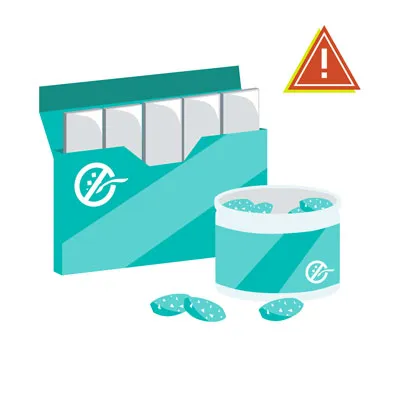 Sugar-free products containing xylitol are extremely dangerous and can cause a rapid drop in blood sugar.
Sugar-free products containing xylitol are extremely dangerous and can cause a rapid drop in blood sugar.
Poisoning cases involving this artificial sweetener are unfortunately on the rise. The amount of xylitol found in just five pieces of gum has the potential to be fatal for a 65-pound dog. Always check ingredient labels for xylitol, especially in sugar-free products. This is a crucial item when discussing what are some foods that dogs can t eat.
Tomatoes and Raw Potatoes
Tomatoes and potatoes fall into the category of “safe in some forms, unsafe in others.” A ripened red tomato is generally safe for dogs. However, the green parts of the tomato plant, along with green, unripe tomatoes, contain solanine, which is toxic to dogs.
Potatoes follow a similar rule. If they are baked or boiled without any additives, they are generally safe in small amounts. However, raw potatoes also contain solanine, making them toxic to dogs. Always ensure potatoes are cooked and served plain.
Tobacco
Tobacco is exceptionally dangerous and unhealthy for your dog. Exposure to nicotine-containing products, whether cigarettes, cigars, chewing tobacco, or e-liquid, can cause a wide range of severe symptoms. These include vomiting, diarrhea, rapid or labored breathing, agitation, abnormal heart rate, wobbliness, muscle weakness, high or low blood pressure, seizures, and tremors.
More significant or frequent exposure to tobacco may lead to blue gums and coma, and ultimately, it can be fatal. Dogs are naturally curious and might ingest a discarded cigarette butt on a walk or nose through an ashtray. If your dog gets into tobacco, immediate veterinary attention is critical, as you need to act fast.
Yeast and Raw Dough
Yeast and raw dough are unsafe for dogs for several critical reasons. The raw dough can expand significantly in your dog’s stomach, causing severe pain and potentially life-threatening conditions like gastric torsion or rupture of the stomach.
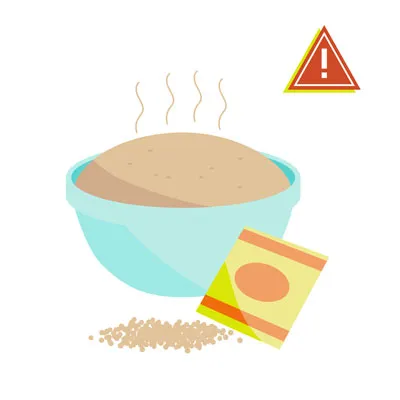 Raw dough can expand in a dog's stomach and cause alcohol toxicity.
Raw dough can expand in a dog's stomach and cause alcohol toxicity.
Furthermore, the yeast and sugar present in raw dough can ferment, producing alcohol and leading to alcohol toxicity. This condition can rapidly become fatal, necessitating immediate medical intervention. Always keep raw dough out of your dog’s reach.
Raw Meat
Never feed your dog raw or undercooked meat. The possible presence of harmful bacteria like Salmonella or E. coli in raw meat can be just as detrimental to dogs as it is to humans, causing severe gastrointestinal illness. Additionally, bones found in raw meat pose a significant choking hazard and can also splinter, causing internal damage or obstructions. Always ensure meat is fully cooked and boneless before offering it to your dog.
Rhubarb
Rhubarb, a plant commonly used in desserts, is not safe for pets. Its leaves contain soluble calcium oxalate crystals. If eaten in sufficiently large quantities, these crystals can bind with calcium in the body, causing a dangerous drop in calcium levels and potentially leading to renal (kidney) failure, which can be life-threatening. Symptoms of rhubarb poisoning include tremors, weakness, drooling, bloody urine, changes in thirst and urination patterns, and vomiting.
Star Fruit
Similar to rhubarb, star fruit also contains soluble calcium oxalate crystals. It is best not to let your dog snack on this fruit due to the potential for similar toxic effects on their system, especially concerning kidney health.
Flavored Water and Seltzer Water
It is always best to err on the side of caution and provide your dog with fresh, clean plain water rather than anything flavored or carbonated. Seltzer and flavored waters can contain added ingredients that are dangerous for pups, such as excessive sugar or salt. While plain seltzer water might be acceptable in small, urgent amounts, it can lead to gas and bloating. The safest and healthiest choice is always plain water.
Foods Safe for Dogs
While the list of foods that dogs cannot eat is extensive, there are also many safe and healthy human foods that dogs can enjoy in moderation. Some of the safest and most popular choices include dehydrated chicken or beef (in very small amounts), apples (without the core), green beans, and carrots.
Here are some popular and safe foods your dog can eat. This list is not exhaustive but provides a great starting point for healthy treats.
Apples, Oranges, and Bananas
You must avoid apple cores and seeds due to their toxicity; however, the fleshy parts of apples without seeds are perfectly fine for your dogs. It’s best to cut off small pieces of apple to eliminate any risk of your dog ingesting the core. Oranges are safe when given in small amounts. And in moderation, bananas (peeled) can also serve as a tasty and nutritious treat for your pup.
Blueberries and Blackberries
Blueberries are a delightful and healthy treat that your dog will likely love. They are packed with antioxidants, fiber, phytochemicals, and vitamin C, all of which contribute positively to your dog’s overall health. Blackberries also offer similar nutritional benefits and can be a safe treat.
Cantaloupe, Mango, Peaches, Pears, Pineapples, and Watermelons
There is a wide variety of fruits that your dog can safely enjoy, so feel free to experiment to discover which ones they like best! Cantaloupes are an excellent choice to start with. Your dog might also thoroughly enjoy watermelon, provided you remove all rinds and seeds (including the pale seeds in seedless varieties) to prevent choking hazards. Since watermelon is primarily water, it can be an especially refreshing treat on a warm day.
Mangoes, peaches, pears, and pineapples are also safe in moderation. Always ensure you remove all seeds, pits, and cores before allowing your pup to enjoy these fruity treats.
Carrots, Cucumber, and Celery
Looking for more healthy and low-calorie options? Remember the three C’s: carrots, cucumbers, and celery. These vegetables and fruits are particularly great choices for overweight dogs due to their very low-calorie content.
Bite-sized carrot pieces offer a satisfying crunch that many dogs adore. Celery bites also provide a fun crunch and can even help with bad breath. Cucumber slices are rich in vitamins and minerals while being very low in carbohydrates or fats, making them an excellent healthy snack.
Cheese
While it’s generally advisable for dogs to avoid milk and most dairy products, a small amount of cheese given occasionally can be acceptable, especially if you know your dog isn’t lactose intolerant. However, remember that some cheeses can be high in fat, which can be detrimental to dogs. Therefore, opt for lower-fat varieties, such as a small piece of mozzarella, or consult your veterinarian to determine the best type of cheese for your pet.
Eggs
Fully cooked eggs can be a tasty and beneficial treat for your dog. Scrambled eggs, cooked plain, can help soothe an upset stomach and provide an excellent source of protein. Always ensure eggs are thoroughly cooked to eliminate any risk of salmonella.
Peanuts, Peanut Butter, and Cashews
Peanuts and cashews are safe for dogs when given in small quantities. Due to their high fat content, however, you should offer them only sparingly as an occasional treat. Ensure they are unseasoned, unflavored, and unsalted.
Regarding peanut butter, in moderation, it is a delicious and high-protein treat for your pup. Always look for unsalted peanut butter and, most importantly, avoid any sugar-free varieties that may contain xylitol, which is highly toxic to dogs.
Popcorn and Corn
Popcorn can be another enjoyable treat for your dog. Choose air-popped, unsalted, and unbuttered popcorn. Thoroughly check the popcorn to ensure your pup doesn’t ingest any unpopped kernels, which could pose a choking hazard.
Naturally, plain corn (removed from the cob) is also acceptable when given without butter, salt, or spices. It can be a good source of fiber for your dog.
Coconut and Honey
In small amounts, coconut is generally fine for your dog, including coconut milk and coconut oil. It contains lauric acid and may even help with allergies. However, some dogs may experience an upset stomach from fresh coconut or coconut milk, so introduce it with caution. Avoid coconut water, which is not safe for dogs due to its potassium levels. Also, do not let your dog eat the fibrous shell, which could cause choking or intestinal obstruction.
Honey in moderation is also safe for dogs and provides numerous vitamins and minerals that can be beneficial for your pup’s health.
Shrimp and Fish
Plain, fully cooked shrimp is an excellent choice for your dog. Always remove the shell, head, tail, and legs, and avoid any shrimp that has been seasoned, salted, or buttered.
Fish is also permissible, with salmon and sardines being particularly good options. Ensure the fish is plain, fully cooked, and entirely boneless. A good general rule is to offer fish to your dog no more than twice a week to maintain a balanced diet. Plain, canned tuna, packed in water (not oil), is safe in moderation to avoid excessive mercury and salt intake.
Turkey
Turkey meat is a healthy and safe option for dogs once the skin, fat, and bones have been removed. Offer small bites of plain, cooked turkey as a delicious treat and a great source of lean protein. Always avoid anything seasoned or salted.
Grains, Wheat, and Quinoa
What about grains, wheat, or quinoa? Just like corn, small amounts of wheat or other grains are perfectly fine for dogs. Quinoa, in particular, is considered a healthier option than many other fillers. Be sure to monitor your dog for any signs of allergic reactions when introducing new grains.
Green Beans
Many dogs thoroughly enjoy green beans, whether they are served raw, steamed, or from a can. They are safe, tasty, and healthy—a fantastic combination for a dog treat. Look for green beans that are either raw or cooked plain, without any added spices, oils, or salt. Cut them into small, bite-sized pieces to prevent choking.
What Dogs Are Most at Risk if They Consume Toxic Foods?
While every dog should be protected from ingesting toxic foods, some dogs are inherently more vulnerable than others. Understanding these risk factors can help you be even more vigilant.
- Small breeds vs. large breeds: Smaller dogs are at a higher risk due to their lower body weight. Toxic substances, like chocolate, can have a much more concentrated and severe effect on them compared to larger breeds.
- Puppies: Younger dogs have less developed digestive and immune systems, which makes them more susceptible to the adverse effects of certain substances. This heightened risk even extends to foods like raw dog food for puppies.
- Elderly dogs: Older dogs may face higher risks due to other underlying health conditions they might have. For example, dogs with existing health problems should particularly avoid raw dog food.
- Dogs with pre-existing conditions: Many pre-existing health conditions, such as diabetes or kidney disease, can significantly increase a dog’s risk and sensitivity to toxic foods.
How To Prevent Dogs from Eating Toxic Foods
While accidents can sometimes occur despite our best efforts, you can take several proactive steps to minimize the risk of your beloved pup getting into unsafe human food. Prevention is always better than cure when it comes to your dog’s health.
1. Store Foods Out of Reach
Ensure that your dog cannot access any toxic foods. Keep dangerous items on high shelves that are too tall for your dog to reach, or securely lock them away in cabinets that your pup cannot open. Child-proof latches can be very effective for curious canines.
2. Avoid Feeding Dogs from Your Plate
Resist the urge to feed your dog from your plate or offer scraps while you are cooking in the kitchen, even if you intend it as a small treat. It is safest to only give your pup treats that are specifically manufactured and approved for dogs. This practice also helps prevent begging behavior.
3. Educate Family Members and Guests
Take the time to educate all family members, including children, and any guests about the importance of not sneaking food to your dog. Explain that no matter how tempting it may be, sharing human food can be dangerous for pets.
4. Be Careful During Holidays
Be extra cautious during holidays or large gatherings. The busy atmosphere, extra food, and distractions can make it easy to let your guard down while cooking or entertaining. Keep toxic holiday foods, such as chocolate, grapes, and rich, fatty meats, completely out of reach.
If, despite your precautions, your dog does consume something toxic, being prepared can help you act quickly. Keep emergency contact information readily accessible for 24/7 emergency veterinarians, including those available on holidays, and for pet poison control hotlines.
What To Do if Your Dog Eats Something Toxic
If you suspect your dog has eaten toxic food, it is paramount to seek help as quickly as possible. Time is of the essence in these situations.
Familiarize yourself with the symptoms of food toxicity so you can quickly recognize if your dog has ingested something harmful. The symptoms vary depending on what your pup consumed but can include listlessness, distress, pain, vomiting, bloody stools, or a bloated stomach that feels hard to the touch due to gas. This painful condition can cause the stomach to rupture if not treated promptly.
If you notice any of these symptoms or suspect poisoning, do the following:
- Call your veterinarian or a poison control center immediately. Timing is vital for successful treatment and shorter hospitalization stays.
- Be prepared with all important information. This includes the type of food eaten, the estimated amount consumed, and the time of ingestion.
- Avoid home remedies unless specifically advised by your veterinarian. Remedies can vary significantly depending on the ingested substance, and even inducing vomiting can be harmful in certain cases.
Dog Care Story Can Help You Keep Your Dog Healthy
From common household toxins to dangerous foods, it can be challenging to keep track of everything your dog shouldn’t get into. Dogs don’t always have the most discerning taste, and their curiosity can sometimes lead them into trouble. However, by following this comprehensive guide and remaining vigilant, you can significantly help keep your dog safe from foods that could harm them.
The good news is that there are plenty of foods that are safe and healthy for your dog to enjoy! Explore our list of safe foods and discover which ones your dog loves, offering them as treats when they’ve been good. If you are ever unsure about any food item, always consult with your veterinarian for expert advice tailored to your pet’s needs.
Remember, understanding what foods are not safe for dogs to eat is one of the most important aspects of responsible pet ownership.
Sources/Citations:
- “Top 10 dog poisons,” Hilary Parker (5/2023), WebMD, https://www.webmd.com/pets/dogs/top-10-dog-poisons
- “What happens if a dog eats chocolate?” (10/2023), Colorado State University, https://vetmedbiosci.colostate.edu/vth/animal-health/why-is-chocolate-bad-for-dogs/
- “Fruits and vegetables dogs can or can’t eat,” (3/2024), American Kennel Club, https://www.akc.org/expert-advice/nutrition/fruits-vegetables-dogs-can-and-cant-eat/
- “What to do if your dog drinks alcohol,” Jerry Klein (7/2023), American Kennel Club, https://www.akc.org/expert-advice/vets-corner/is-alcohol-dangerous-for-dogs/
- “Can dogs eat apples?” Hector Joy (12/2022), PetMD, https://www.petmd.com/dog/general-health/can-dogs-eat-apples
- “Can dogs eat plums?” Katie Koschalk (7/2023), Chewy, https://be.chewy.com/nutrition-pet-diet-tips-can-dogs-eat-plums/
- “Avocado (Persea spp) Toxicosis in Animals,” Cristine Hayes (9/2024), Merck Veterinary Manual, https://www.merckvetmanual.com/toxicology/food-hazards/avocado-persea-spp-toxicosis-in-animals
- “People foods to avoid feeding your pets,” (n.d.), ASPCA, https://www.aspca.org/pet-care/animal-poison-control/people-foods-avoid-feeding-your-pets
- “People foods dogs can and can’t eat,” (3/2024), American Kennel Club, https://www.akc.org/expert-advice/nutrition/human-foods-dogs-can-and-cant-eat/
- “Can dogs eat nuts?” Amanda Ardente (1/2023), PetMD, https://www.petmd.com/dog/nutrition/can-dogs-eat-nuts
- “Can dogs drink milk?” Sandra C. Mitchell (1/2024), PetMD, https://www.petmd.com/dog/nutrition/can-dogs-drink-milk
- “Can dogs have nutmeg?” Barri J. Morrison (11/2023), PetMD, https://www.petmd.com/nutmeg-safe-dogs
- “Onion, garlic, chive, and leek poisoning in dogs,” Renee Schmid et al. (2024), VCA Animal Hospitals, https://vcahospitals.com/know-your-pet/onion-garlic-chive-and-leek-toxicity-in-dogs
- “Can dogs eat tomatoes?” Anna Burke (10/2024), American Kennel Club, https://www.akc.org/expert-advice/nutrition/can-dogs-eat-tomatoes/
- “Can dogs eat potatoes?” Katherine Ripley (11/2023), American Kennel Club, https://www.akc.org/expert-advice/nutrition/can-dogs-eat-potatoes/
- “What to do if your dog eats a cigarette butt,” (6/2023), American Kennel Club, https://www.akc.org/expert-advice/health/dog-ate-cigarette-butt/
- “Dough & dogs: Why it’s bad and what you can do,” Lisa Goldstein (7/2024), Preventive Vet, https://www.preventivevet.com/dogs/dough-is-toxic-to-dogs
- “Rhubarb,” (n.d.), Pet Poison Helpline, https://www.petpoisonhelpline.com/poison/rhubarb/
- “Can dogs drink carbonated water?” Heather Logue (n.d.), Rover, https://www.rover.com/blog/can-dogs-drink-carbonated-water/
- “What fruits can dogs eat?” Ellen Malmanger (2/2024), PetMD, https://www.petmd.com/dog/nutrition/what-fruits-can-dogs-eat
- “Can dogs have green beans?” Anna Burke (8/2022), American Kennel Club, https://www.akc.org/expert-advice/nutrition/can-dogs-have-green-beans/
- “About pet food safety,” (4/2024), CDC, https://www.cdc.gov/healthy-pets/about/pet-food-safety.html
